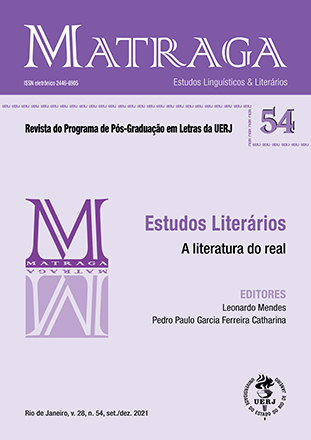Da revista ao livro: Brandão entre o mar e o amor (1941), ficção coletiva e realismo na Geração de 1930
DOI:
https://doi.org/10.12957/matraga.2021.58857Palavras-chave:
Realismo, Jornalismo, Romance coletivo, História literária, Geração de 1930.Resumo
A publicação no início dos anos 1940, na revista Diretrizes, de Brandão entre o mar e o amor, assinado por Jorge Amado, José Lins do Rego, Graciliano Ramos, Aníbal Machado e Rachel de Queiroz, teve de obedecer aos limites impostos pela censura do Estado Novo, que procurava subordinar as publicações às conveniências das alianças externas do país num tempo de guerra. Misto de projeto de ficção e de engajamento dos leitores numa campanha jornalística e publicitária, a obra expõe também projetos literários realistas concorrentes dentro da Geração de 1930. As inconsistências da trama e os contrastes formais permitem observar como escritores que são aproximados pela tradição e pelo cânone expressam culturas, posições políticas e interesses nem sempre conciliáveis. Por outro lado, a falta de unidade na obra expõe também características da literatura pensada para ser lida, primeiramente, em periódicos, e não em livros.
Downloads
Downloads
Publicado
Como Citar
Edição
Seção
Licença
AUTORIZAÇÃO
A Matraga – Revista do Programa de Pós-Graduação em Letras da UERJ está autorizada a publicar o artigo ora submetido, caso seja aceito para publicação online. Fica atestado que a contribuição é original, que não está sendo submetida a outro editor para publicação, e que a presente declaração é a expressão da verdade.
Os trabalhos publicados no espaço virtual da Matraga – Revista do Programa de Pós-Graduação em Letras da UERJ serão automaticamente cedidos, ficando os seus direitos autorais reservados à Matraga. Sua reprodução, total ou parcial, é condicionada à citação dos autores e dos dados da publicação.

A Matraga utiliza uma Licença Creative Commons - Atribuição-NãoComercial 4.0 Internacional.





